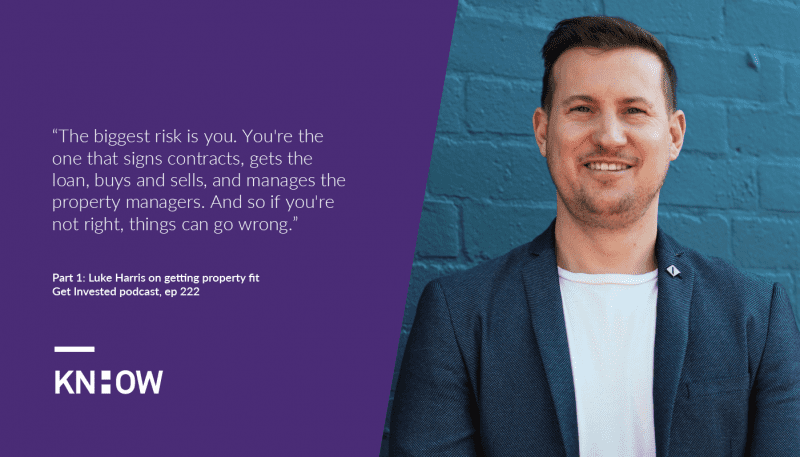Investor and author Luke Harris says the biggest risk factor for investors is themselves. So understanding yourself, and your strategy, is key to investment success.
Luke is also founder of The Property Mentors in Melbourne.
Boasting an impressive property portfolio, Luke has learned over his 20-year journey that successful investing comes down to how well you know yourself and your long-term plan.
“It’s about understanding where you are in the three stages of readiness – emotional, educational and financial. People may not be a ten on all of them, and over time you’re going to change. Your emotional, financial and educational readiness is going to go up and down like a yo-yo. And the more you learn, the more you realise you don’t know. And so the main thing is, is if we’ve addressed these points, at least we’re aware of their mindset behind the investing in the first place,” Luke told KnowHow founder Bushy Martin on the Get Invested podcast.
“Because people always say, what’s the biggest risk with investing? Well it’s you. You’re the one that signs contracts. You’re the one that gets the loan. You’re the one that buys and sells. You’re the one that manages the property managers. And so if you’re not right, things can go wrong. It’s very rare that people have had that conversation. And when we go through having that conversation with people to really understand what type of investor they are, unless you identify that, you can’t change anything.”
Once you understand yourself as an investor, it’s equally important to understand your strategy. Without this, Luke warned you can fall trap into purchasing property that isn’t actually suited to you or your goals.
“The property is definitely part of the the long term plan. But at the same time, you need the property to work for you. Because if the property is not going to work for you, then you’re probably going to give up after a few years,” he said.
“And this is the biggest challenge that we’ve seen. The ATO and the ABS statistics don’t lie, and the numbers are that most investors don’t have more than one or two properties, and very few property investors own three or more properties. And the reason for that is not because they can’t buy more properties in most cases, it’s that they’ve structured themselves in a way that they can’t. And if they’d structured themselves correctly, they could continue buying properties.”
Luke also said understanding your strategy and needs will help you to ignore misleading media commentary, such as the message that ‘new properties are bad’.
“One of the things that people harp on about a lot in various media channels and so forth is that new properties are bad. Now, I don’t have an issue with buying new properties. A lot of my properties have been new properties. But the key thing is that if your first property is a brand new property, a lot of the times there can be some tax savings. And repairs and maintenance is also very minimal. So you’re not having dents in your cash flow that are affected because of huge repair bills,” he said.
“For example, I’ve got a house in Airlie Beach at the moment, and the whole floor of the bathroom’s just fallen through and we’ve got to put a whole new floor in right now. That’s not a good investment for most people. It is something that’s going to be in my portfolio for some time, (because) I’ll cut down and put a nice little property on it one day. But that’s my plan and strategy, not others. To spend $5,000 on a floor, it will hurt a lot of investors. And then the hot water system goes, then the roof leaks and then something else happens. And the problem is, if people feel that their own money has to go into their tenant’s property, even though it’s their property, they feel like it’s not working for them. So your cashflow is affected because of the type of property you bought, whereas a new property typically has less hassles.
“And then the demographics and population in Australia is changing. People want to live in rentals. People want to rent, and there’s a lot of people renting for longer periods of time and they want to live with the modern conveniences that we have. They want dishwashers, nice carpet, and stone bench tops, and new properties provide those things. So I think people buying the wrong property to start with can really set themselves up for failure from the outset.”
Listen to the Part 1 of the interview here.
Want to Know How you can build wealth with the help of leading, qualified experts? Talk to the team at KnowHow, now.




